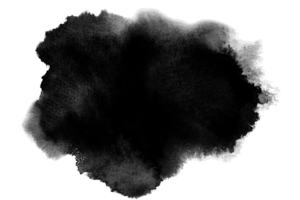What Does the Color Black Mean in Psychology?

Colors are an invention of the brain. In fact, they’re nothing more than a subjective representation of the wavelengths that your eye captures. Therefore, the color black, although we call it as such, is simply the absence of light.
In the field of psychology, black has a specific meaning. Indeed, the cognitive representations of colors, although arbitrary, have effects on the emotions and abstractions of the individual. Black, in particular, has always been identified with dark feelings. That’s because our fear of the dark is primitive and adaptive.
Psychology has analyzed in depth the effects that colors have on the human mind. If you’re interested in this subject, particularly the effects of the color black, read on.
The absence of light
Color, as we mentioned earlier, is nothing more than a drawing that the brain paints in your mind, according to how far the light reaches that your eyes capture. In this way, long wavelengths result in warm colors, such as yellow, orange, and red. Conversely, light that’s reflected from a shorter distance will have cooler hues, such as blue.
In the case of black, it’s been considered as the total absence of color and as the opposite of white. However, in reality, it’s not so much the absence of color as the absence of light. Indeed, when an object is black, we perceive it in this way because it’s absorbing most of the wavelengths that reach it.
It isn’t correct to say that black is perceived when the surface of an object absorbs all wavelengths, but most of them. Because if it didn’t reflect any light, black would be invisible.
It’s paradoxical to speak of the perception of the color black. That’s because, in reality, it’s about our partial inability to perceive it. In fact, as the amount of light reflected in our eyes decreases, our vision darkens.

The meaning of the color black
The most basic symbolic connection of the color black is with darkness and night. As a result, the semantics of this color have become pejorative throughout the development of collective thought. This is because of its association with the dangers of the night.
We tend to link the color black with the unknown, the terrifying, and the evil. This association with what can’t be seen by the naked eye forms the basis for associating it with danger and even death. It’s also linked to loneliness, suffering, sadness, and longing. For this reason, in many cultures, the color black is used for funeral rituals.
When it comes to personal attributes, black is associated with cruelty, lying, manipulation, betrayal, and concealment. It’s also been linked to the individualism and introversion of withdrawn and mysterious people.
However, not all connotations of black are pejorative in psychology. In fact, it’s a color that’s used a lot to hint at mystery, elegance, seriousness, power, and self-reliance. It’s also a symbol of simplicity, order, and rest.
According to Eva Heller, author of the famous book, Psychology of Color, the color black is associated with youth and impartiality. Its practical use tends to generate trust in others due to its sobriety and formality. On the other hand, it can also be intimidating.
The color black in different areas
With the development of culture and psychology, the symbolism of color has expanded and diversified among different areas of life. In order to give some specific information about the meaning of the color black, here are some different areas where it’s used to achieve specific psychological effects.
The color black in marketing
Nothing’s ever random in marketing. Everything’s carefully measured to control the impression that the product makes on the consumer. For this reason, a company wouldn’t launch a product on the market without having first studied its color.
In the marketing field, black evokes mystery and the need for discovery. It’s usually associated with luxury products and technology. When it comes to logos, it’s proven that neutral colors, like black and gray, are associated with the psychological dimensions of sincerity, uniqueness, and sophistication.
The color black in architecture and design
The impact of the environment and decoration on our mood is also one of the most studied areas, especially in commercial facilities and other customer-facing services. In this sense, the perception of color plays a determining role in the relationship that the individual establishes with the environment.
In interiors, black is used to highlight other colors, as it makes them appear brighter. By itself, this color creates a sense of abstraction and strangeness. In addition, it greatly increases the depth perception of spaces.
The color black in the psychology of everyday life
As mentioned above, the use of black at funerals is common in Western cultures. This is thought to have a certain adaptive meaning, in the sense of the camouflage it gave to the act of burying corpses at night. However, with the passage of time, this color has become established as part of the ritual of mourning.
On the other hand, in traditional weddings, the man wears black because of the link between this color and strength, security, and formality. In general, in the fashion world, black is used to give an impression of elegance, rebellion, mystery, and professionalism, depending on the field.

Black in different cultures
As we’ve seen, the color black has a primitive component related to the dangers of darkness. However, in the collective psychology of each different culture, it’s developed its own meaning. Here are some examples:
- Ancient Egypt. Black was a symbol of growth and fertility.
- Tribes of the African savanna. For example, the Maasai associate black with life and prosperity. This is because they link it to the darkening of the sky with the clouds that bring rain.
- Japan. Black is linked to the mysteries of femininity.
- Traditional China. Black is the color of chi or qi, the energy that gives us life. It used to be a symbol of beauty; so much so that it was considered beautiful to dye one’s teeth black.
- Christian, Judaic and Islamic religions. It’s in these cultures that black is mainly associated with pain and death. In Islam, for example, Mecca is considered to be white but was stained black with the sin of men.
- India. The color black is a bad omen, associated with nothingness and evil. However, it’s also used to protect against evil.
The list of meanings of black in psychology extends far beyond what we’ve mentioned in this article. It also has applications in the social field. In fact, the study of color has even been considered relevant in explaining the origins of racism and other historical phenomena of conflict and repression. As you can see, the psychology of color is a really interesting subject to delve into.
All cited sources were thoroughly reviewed by our team to ensure their quality, reliability, currency, and validity. The bibliography of this article was considered reliable and of academic or scientific accuracy.
- Elliot A. J. (2015). Color and psychological functioning: a review of theoretical and empirical work. Frontiers in Psychology, 6, 368. https://www.ncbi.nlm.nih.gov/pmc/articles/PMC4383146/
- Gan, T., Fang, W., & Ge, L. (2016). Colours’ Impact on Morality: Evidence from Event-related Potentials. Scientific Reports, 6, 38373. https://www.ncbi.nlm.nih.gov/pmc/articles/PMC5177878/
- Goldberg, F. J., & Stabler, J. R. (1973). Black and white symbolism in Japan. International Journal of Symbology, 4(3), 37–46. https://psycnet.apa.org/record/1974-30115-001
- Heller, E. (2004). Psicología del color. Editorial Gustavo Gili.
- Sherman, G. D., & Clore, G. L. (2009). The color of sin: white and black are perceptual symbols of moral purity and pollution. Psychological Science, 20(8), 1019–1025. https://pubmed.ncbi.nlm.nih.gov/19619180/
- Rivera, M. E. (2001). Percepción y significado del color en diferentes grupos sociales. Investigación Universitaria Multidisciplinaria: Revista de Investigación de la Universidad Simón Bolívar, (3), 74-83. https://dialnet.unirioja.es/servlet/articulo?codigo=3684094
- Segura, N. (2016). Marketing del color. ¿Cómo influye el color del logotipo en la personalidad de una marca?[Tesis de maestría, Universidad de Chile]. Archivo digital. https://repositorio.uchile.cl/handle/2250/140132
- Yılmaz, A. (2017). Color of absence and presence: Reconsidering black in architecture. Color Research & Application, 42(3), 378-387. https://onlinelibrary.wiley.com/doi/abs/10.1002/col.22090
This text is provided for informational purposes only and does not replace consultation with a professional. If in doubt, consult your specialist.








